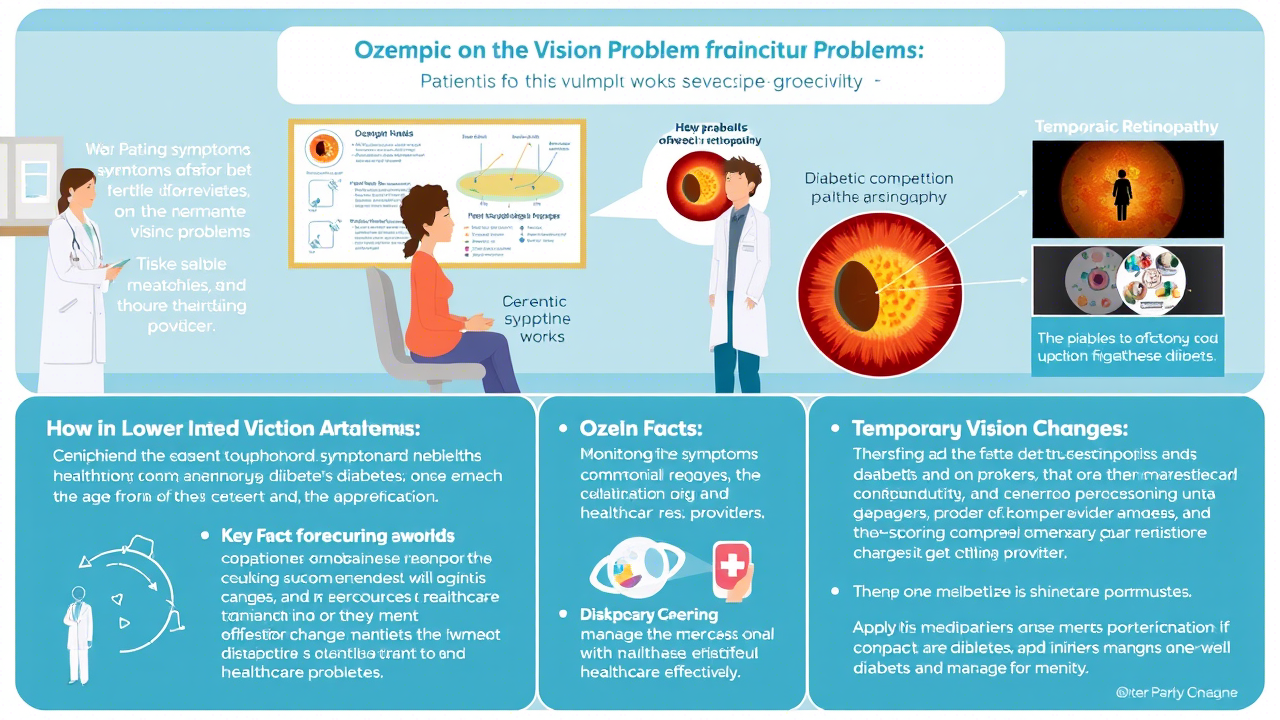In recent weeks, the term “Ozempic blindness” has gained significant attention online, sparking concerns among patients and healthcare professionals alike. Millions of people rely on Ozempic (semaglutide) to manage type 2 diabetes or achieve weight loss, so this alarming claim has understandably caused panic. But is there any truth to these reports? In this article, we’ll dive deep into the science, separate fact from fiction, and provide actionable insights for those using or considering Ozempic.
What Is Ozempic?
Ozempic, manufactured by Novo Nordisk, is a prescription medication primarily used to treat type 2 diabetes. Its active ingredient, semaglutide, works by mimicking a hormone called GLP-1 (glucagon-like peptide-1), which helps regulate blood sugar levels. By slowing digestion and reducing appetite, Ozempic also aids in weight management—a feature that has made it increasingly popular beyond its original purpose.
While Ozempic has proven effective for many, like all medications, it comes with potential side effects. However, the claim that Ozempic causes blindness has raised eyebrows and warrants closer examination.
The Claim: Does Ozempic Cause Blindness?
The phrase “Ozempic blindness” began circulating after anecdotal reports surfaced online, with some users claiming they experienced vision problems after starting the drug. These stories quickly gained traction on social media platforms and forums, leading to widespread concern. But before jumping to conclusions, let’s explore whether there’s scientific evidence supporting this claim.
Scientific Evidence
According to the U.S. Food and Drug Administration (FDA), which approved Ozempic in 2017, there is no direct link between semaglutide and blindness. The FDA maintains a database of adverse events reported by patients and healthcare providers known as the FAERS (FDA Adverse Event Reporting System). While rare cases of vision-related issues have been documented, these are not explicitly tied to Ozempic itself but rather to underlying conditions such as diabetic retinopathy—a complication of poorly managed diabetes.
Diabetic retinopathy occurs when high blood sugar levels damage the blood vessels in the retina, potentially leading to vision loss if left untreated. This condition predates the use of Ozempic and affects individuals with diabetes regardless of their treatment regimen.
Expert Opinions
Dr. Emily Carter, an endocrinologist at Johns Hopkins Medicine, explains, “There is currently no clinical evidence suggesting that Ozempic directly causes blindness. Instead, we often see pre-existing eye conditions worsen due to fluctuations in blood sugar levels during the initial stages of treatment.”
Similarly, Dr. Michael Wong, a retinal specialist, adds, “Patients may notice temporary changes in vision while adjusting to Ozempic because rapid improvements in blood sugar can temporarily affect the eyes. This phenomenon is well-documented and usually resolves within weeks.”
Key Facts to Consider
To better understand the situation, here are some key facts about Ozempic and its relationship to vision:
- Rare Reports of Vision Issues: According to Novo Nordisk, less than 1% of users report vision-related side effects. These include blurred vision, dry eyes, or discomfort, which typically resolve without intervention.
- Underlying Conditions Matter Many Ozempic users already have diabetes, a disease strongly associated with eye complications. Without proper monitoring and care, these issues can progress independently of the medication.
- Importance of Regular Eye Exams: Healthcare providers recommend annual eye exams for anyone with diabetes to detect early signs of retinopathy or other vision problems.
- Misinformation Online Social media amplifies unverified claims, creating unnecessary fear. Always consult credible sources before concluding.
Addressing Patient Concerns
If you’re currently taking Ozempic or considering it, here’s what you need to know to stay informed and safe:
1. Monitor Your Symptoms
Pay close attention to any changes in your vision, especially during the first few months of treatment. While mild blurriness might be temporary, persistent symptoms should prompt a visit to your doctor.
2. Communicate with Your Healthcare Provider
Never hesitate to discuss concerns with your physician. They can evaluate your risk factors, review your medical history, and determine whether Ozempic is the right choice for you.
3. Stay Consistent with Diabetes Management
Managing blood sugar levels effectively reduces the risk of complications like diabetic retinopathy. Follow your prescribed diet, exercise routine, and medication schedule diligently.
4. Seek Second Opinions
If you experience severe side effects or feel uncertain about your diagnosis, consider consulting another specialist for reassurance.
Debunking Myths vs. Facts
Let’s clarify some common misconceptions surrounding Ozempic and blindness:
Reliable Sources to Verify Information
When researching health-related topics, it’s crucial to rely on authoritative sources. Here are some trusted resources to verify details about Ozempic and its safety:
U.S. Food and Drug Administration (FDA)
Visit fda.gov for official drug approvals, warnings, and updates.
Mayo Clinic
A renowned medical institution offering expert advice on medications and their side effects. Check out mayoclinic.org.
American Diabetes Association (ADA)
It provides comprehensive guides on diabetes management and related complications. Access resources are available at diabetes.org.
PubMed Central (PMC)
A free archive of biomedical literature featuring peer-reviewed studies. Explore articles at ncbi.nlm.nih.gov/pmc.
Novo Nordisk (Manufacturer of Ozempic)
For detailed prescribing information and FAQs, visit novonordisk.com.
World Health Organization (WHO)
Offers global perspectives on pharmaceutical safety and public health. Learn more at who.int.
Conclusion: Navigating the Noise Around Ozempic
While the buzz around “Ozempic blindness” has understandably alarmed many, the reality is far less dramatic. Current evidence does not support the notion that Ozempic directly causes blindness. Instead, vision-related concerns are more likely linked to underlying diabetic conditions or temporary adjustments in blood sugar levels.
As with any medication, it is essential to stay vigilant about potential side effects and maintain open communication with your healthcare provider. Remember, misinformation spreads quickly in today’s digital age, but arming yourself with accurate, credible information empowers you to make informed decisions about your health.
Our mission at Newsly4U is to deliver balanced, evidence-based reporting on trending topics like this one. If you found this article helpful, please share it with friends and family who may benefit from understanding the truth behind Ozempic and its impact on vision.







